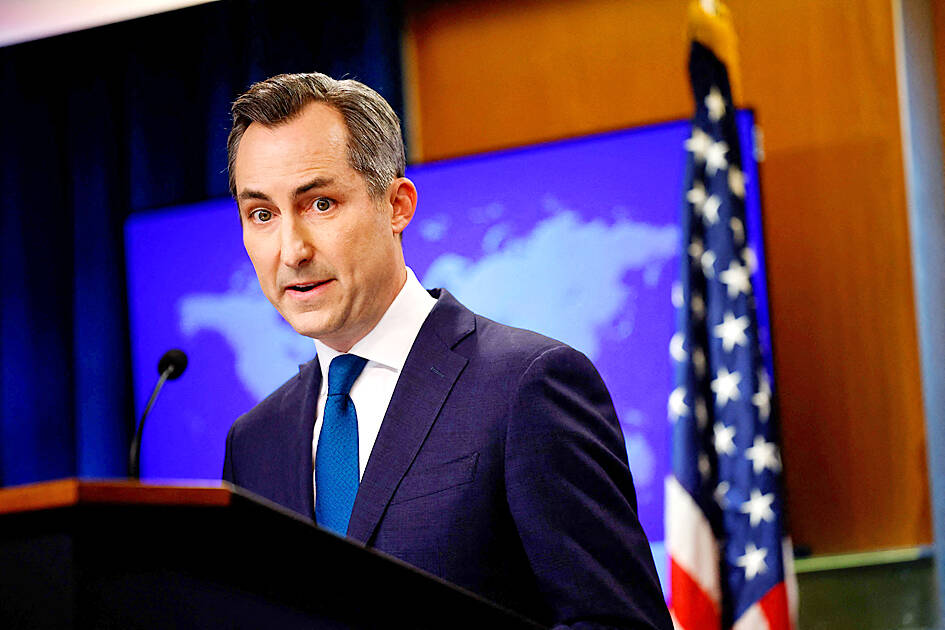The US has expressed concern over China’s “unwarranted” and potentially escalatory military drills around Taiwan.
“The United States is seriously concerned by the [Chinese] People’s Liberation Army [PLA] joint military drills in the Taiwan Strait and around Taiwan,” US Department of State spokesman Matthew Miller said in a statement late on Sunday (US time).
“The PRC [People’s Republic of China] response with military provocations to a routine annual speech is unwarranted and risks escalation,” he said.

Photo: AFP
The PLA announced early yesterday morning that it had launched military drills code-named “Joint Sword-2024B” involving its army, navy, air and rocket forces in the Taiwan Strait and areas to the north, south and east of Taiwan, as a “stern warning to the separatist acts of Taiwan independence forces.”
In its statement, the state department called on China to “act with restraint and avoid any further actions that may undermine peace and stability” across the Taiwan Strait and in the broader region, which is “essential to regional peace and prosperity and a matter of international concern.”
“We continue to monitor PRC activities and coordinate with allies and partners regarding our shared concerns,” it said.
In Tokyo, Japanese Prime Minister Shigeru Ishiba said that peace in the Taiwan Strait and its surrounding area is of vital interest to Japan, and that Tokyo would continue to monitor the situation and prepare potential responses.
Japanese Minister of Foreign Affairs Takeshi Iwaya and Minister of Defense Gen Nakatani also both emphasized the importance of peace in the Taiwan Strait to regional security and stability.
Japan will continue to pay close attention to developments and relevant trends, they added.
The EU urged “restraint” on all sides, while warning against “unilateral actions” that change the “status quo,” in a veiled reference to Beijing.
“We call on all parties to exercise restraint and avoid any actions that may further escalate cross-strait tensions, which should be resolved through dialogue,” EU spokesperson for foreign affairs and security policy Nabila Massrali said in a statement.
The military activities increased cross-strait tensions, the EU said, adding that stability in the Taiwan Strait is of strategic importance for global security.
“We oppose any unilateral actions that change the status quo by force or coercion,” Massrali said.
China previously held similar large-scale military drills, named Joint Sword-2024A drills , and encircled Taiwan on May 23 and 24, just days after Lai’s presidential inauguration.
It also conducted large-scale military exercises in August 2022, following a visit to Taiwan by then-US House of Representatives speaker Nancy Pelosi.
Lin Ying-yu (林穎佑), an assistant professor at Tamkang University’s Graduate Institute of International Affairs and Strategic Studies, said that China’s timing of the Joint Sword-2024B military drills was meant to test the US’ ability to simultaneously respond to crises in the Taiwan Strait and on the Korean Peninsula.
Referencing the map released by China detailing the locations of the Joint Sword-2024B drills, Lin said PLA forces were positioned closer to Taiwan proper than they were during the drills in May.
Su Tzu-yun (蘇紫雲), a research fellow at the Institute for National Defense and Security Research, said China’s drills were “70 percent political, 30 percent military,” because “no matter what Taiwan does or says, China will not be satisfied.”
Regardless, a noteworthy segment of Joint Sword-2024B was the blockade of critical harbors to deny access to Taiwan’s allies taking the maritime route to its assistance, he said.
Additional reporting by AFP

‘WIN-WIN’: The Philippines, and central and eastern European countries are important potential drone cooperation partners, Minister of Foreign Affairs Lin Chia-lung said Minister of Foreign Affairs Lin Chia-lung (林佳龍) in an interview published yesterday confirmed that there are joint ventures between Taiwan and Poland in the drone industry. Lin made the remark in an exclusive interview with the Chinese-language Liberty Times (the Taipei Times’ sister paper). The government-backed Taiwan Excellence Drone International Business Opportunities Alliance and the Polish Chamber of Unmanned Systems on Wednesday last week signed a memorandum of understanding in Poland to develop a “non-China” supply chain for drones and work together on key technologies. Asked if Taiwan prioritized Poland among central and eastern European countries in drone collaboration, Lin

The US government has signed defense cooperation agreements with Japan and the Philippines to boost the deterrence capabilities of countries in the first island chain, a report by the National Security Bureau (NSB) showed. The main countries on the first island chain include the two nations and Taiwan. The bureau is to present the report at a meeting of the legislature’s Foreign Affairs and National Defense Committee tomorrow. The US military has deployed Typhon missile systems to Japan’s Yamaguchi Prefecture and Zambales province in the Philippines during their joint military exercises. It has also installed NMESIS anti-ship systems in Japan’s Okinawa

The Chien Feng IV (勁蜂, Mighty Hornet) loitering munition is on track to enter flight tests next month in connection with potential adoption by Taiwanese and US armed forces, a government source said yesterday. The kamikaze drone, which boasts a range of 1,000km, debuted at the Taipei Aerospace and Defense Technology Exhibition in September, the official said on condition of anonymity. The Chungshan Institute of Science and Technology and US-based Kratos Defense jointly developed the platform by leveraging the engine and airframe of the latter’s MQM-178 Firejet target drone, they said. The uncrewed aerial vehicle is designed to utilize an artificial intelligence computer

Renewed border fighting between Thailand and Cambodia showed no signs of abating yesterday, leaving hundreds of thousands of displaced people in both countries living in strained conditions as more flooded into temporary shelters. Reporters on the Thai side of the border heard sounds of outgoing, indirect fire yesterday. About 400,000 people have been evacuated from affected areas in Thailand and about 700 schools closed while fighting was ongoing in four border provinces, said Thai Rear Admiral Surasant Kongsiri, a spokesman for the military. Cambodia evacuated more than 127,000 villagers and closed hundreds of schools, the Thai Ministry of Defense said. Thailand’s military announced that